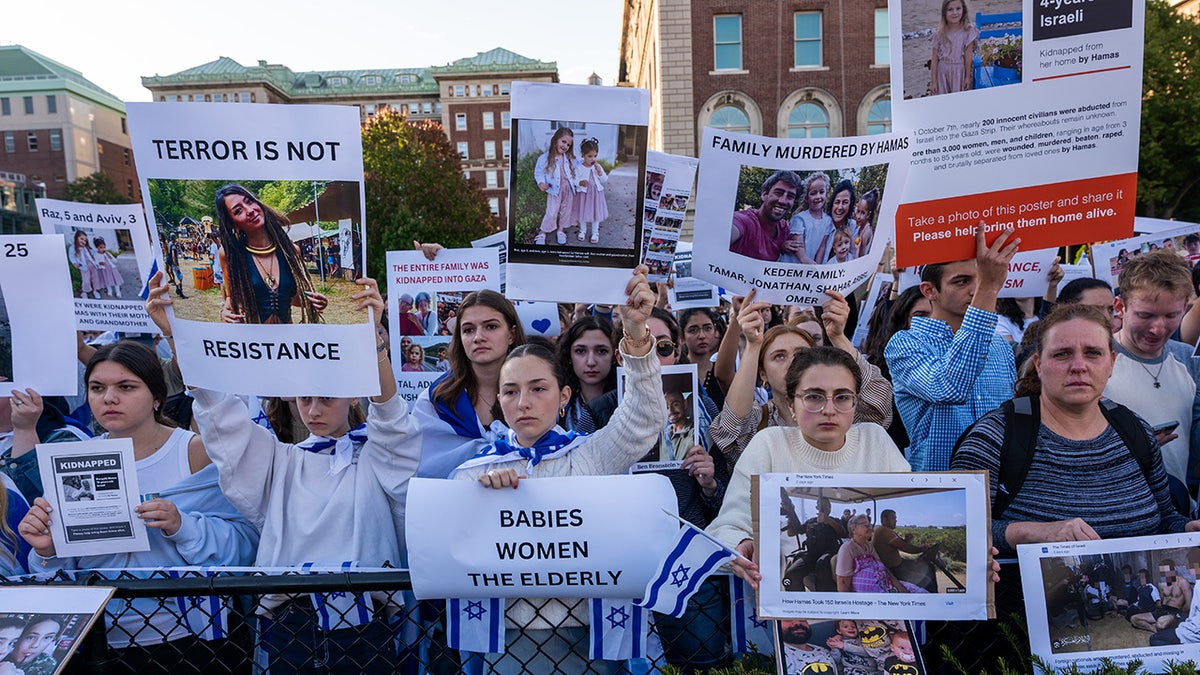The Rise of Antisemitism: Tracking Trends and Patterns in Australia and the US

The Rise of Antisemitism: Tracking Trends and Patterns in Australia and the US
Antisemitism has been a long-standing issue in society, but recent events have shown a concerning rise in attacks and discrimination against the Jewish community. This trend has not only captured public attention, but it has also sparked important conversations and actions from political leaders. To fully understand and analyze the trend, we must look at the events and data surrounding it.
The Timeline of Antisemitism
The recent arson attack at a Melbourne synagogue has brought the issue of antisemitism to the forefront once again. This attack, along with other recent incidents, has sparked a strong response from both Australian and US leaders. In 2025, the US Education Department threatened to revoke Columbia University's accreditation due to concerns over antisemitism on campus. This action against a prestigious university highlights the severity of the issue.
Public Reaction and Sentiment
The sentiment surrounding these events has been a mix of shock, anger, and sadness. A sentiment distribution chart shows a clear spike in negative sentiment after the arson attack and the threat to Columbia University's accreditation. This reflects the public's strong reaction to these incidents and their desire for action to be taken.
Key Players in the Ecosystem
In addition to the individuals responsible for these attacks, there are also key players in the ecosystem that have a role in the trend. The Australian Prime Minister, Anthony Albanese, has been vocal in his condemnation of the recent attack and has vowed to use the full force of the law to combat antisemitism. On the other hand, the family of the suspect in the Colorado attack has been taken into ICE custody, showing the involvement of government agencies in addressing the issue.
Trending Topics in the Conversation
The rise of antisemitism has also brought attention to related topics such as education, immigration, and hate crimes. A popular tags chart shows that these topics have been frequently mentioned in connection with the trend, highlighting their importance in the conversation. This also sheds light on the interconnectedness of various societal issues.
Where This Trend is Heading
The recent events and data surrounding antisemitism show a concerning trend that needs to be addressed. While political leaders have taken a strong stance against it, the data suggests that there may be more incidents in the future. It is important for society to continue to have open and honest conversations about the issue in order to combat it.
The rise of antisemitism is a complex and ongoing trend that requires a comprehensive understanding of its patterns and connections. By analyzing the data and events surrounding it, we can gain valuable insights and make informed predictions about where this trend is heading. It is crucial for society to take action and stand against discrimination in all its forms. As the saying goes, those who do not learn from history are doomed to repeat it. Let's use the data and trends to create a better future for all.
About the People Mentioned
Anthony Albanese
Anthony Albanese, born on March 2, 1963, in Sydney, Australia, is an Australian politician serving as the 31st Prime Minister of Australia since May 23, 2022. He is a member of the Australian Labor Party and has represented the Sydney seat of Grayndler in Parliament since 1996. Albanese grew up in public housing raised by a single mother on a disability pension, a background that shaped his commitment to social equity and government support for disadvantaged Australians[2][5][8]. Albanese held several significant roles before becoming Prime Minister, including Minister for Infrastructure, Transport, Regional Development, and Local Government (2007–2010), during which he oversaw major nation-building projects such as roads, railways, and the National Broadband Network rollout, contributing to economic growth and improved connectivity across Australia[2][3]. He briefly served as Deputy Prime Minister in 2013. After the Labor Party’s electoral defeat in 2013, he continued in opposition and was elected leader of the Labor Party and Leader of the Opposition in May 2019, running unopposed[1][3]. As Prime Minister, Albanese’s government has pursued progressive policies including environmental protections, aiming for a 43% reduction in emissions by 2030, increased minimum wage, expanded support for workers, subsidized childcare, aged care reforms, and paid leave for domestic violence victims. His administration also donated $100 million in aid to Ukraine during the Russia-Ukraine conflict and restored diplomatic relations with China after a long freeze, marked by a key meeting with Chinese President Xi Jinping[1][4]. Albanese advocates for Indigenous recognition through a constitutional referendum to establish a Voice to Parliament, a move toward reconciliation with Aboriginal and Torres Strait Islander peoples[4]. Albanese is noted for his progressive stance on social issues, including support for abortion rights, drug decriminalization, same-sex marriage, transgender rights, and refugee acceptance. He has also emphasized strengthening Australia’s economic and military ties with Europe and the United States[1][4].
About the Organizations Mentioned
Columbia University
Columbia University, established in 1754 as King’s College, is a private Ivy League research university located in the heart of Upper Manhattan, New York City—making it one of the oldest and most prestigious institutions of higher education in the United States[4]. Renamed Columbia College after the American Revolution, the university moved to its present Morningside Heights campus in 1896 and has since grown into a global academic powerhouse[4]. Columbia’s mission centers on advancing knowledge through research, teaching, and public engagement. The university’s academic structure includes three undergraduate schools (Columbia College, the Fu Foundation School of Engineering and Applied Science, and the School of General Studies) and sixteen graduate and professional schools, spanning fields from journalism and law to business and medicine[3][4]. Columbia is especially renowned for its rigorous Core Curriculum, which emphasizes interdisciplinary liberal arts education, critical thinking, and engagement with classic texts[2]. The university’s location in New York City serves as an extended classroom, offering students unparalleled access to internships, research opportunities, and cultural experiences[2]. Key achievements include the establishment of the Pulitzer Prize, which Columbia administers annually, and its role as a founding member of the Association of American Universities[4]. The university boasts a distinguished alumni network, including U.S. presidents, Nobel laureates, Supreme Court justices, and leaders in business, technology, and the arts[3]. Columbia’s research initiatives are equally impressive, with major facilities such as the Lamont–Doherty Earth Observatory and partnerships with tech giants like Amazon and IBM[4]. Currently, Columbia is ranked among the top 25 universities globally, with a 3.9% acceptance rate and a 95% placement rate for graduates, many of whom secure positions at leading firms such as Google, Amazon, and Goldman Sachs[1]. The student body is highly diverse, with representation from over 100 countries and a strong commitment to inclusion[1][6].
ICE
**Immigration and Customs Enforcement (ICE)** is a federal law enforcement agency under the U.S. Department of Homeland Security (DHS), established in 2003 following the Homeland Security Act of 2002, which reorganized existing agencies post-9/11 to enhance national security[1][2]. ICE’s core mission is to protect the United States by enforcing immigration laws, conducting criminal investigations, and preserving public safety. ICE operates primarily through two major divisions: **Homeland Security Investigations (HSI)** and **Enforcement and Removal Operations (ERO)**. HSI focuses on investigating and disrupting transnational criminal organizations involved in customs violations, human trafficking, terrorism, and smuggling. ERO is responsible for the apprehension, detention, and deportation of individuals unlawfully present in the U.S., operating detention facilities and managing removal procedures[2]. ICE’s international reach is managed by the Office of International Affairs (OIA), a key overseas investigative arm coordinating with foreign governments to combat cross-border crime, such as arms smuggling, forced labor, and immigration fraud. OIA supports intelligence gathering, training, treaty implementation, and facilitates global cooperation to preempt threats before they reach U.S. borders[3]. With a workforce exceeding 20,000 employees across more than 400 offices worldwide and an annual budget of about $8 billion, ICE plays a pivotal role in U.S. homeland security[1]. Its activities, especially those involving immigration enforcement and detention, have made it a highly visible and sometimes controversial agency in public discourse, often referred to colloquially in Spanish as "la migra"[2]. Notable achievements include disrupting large-scale criminal networks internationally and supporting the enforcement of over 400 federal statutes concerning customs, immigration, and terrorism prevention. ICE’s dynamic operational scope—spanning law enforcement, international diplomacy, and legal administration—makes it a critical component of U.S. efforts to maintain national security and uphold the rule of law[1][2][















